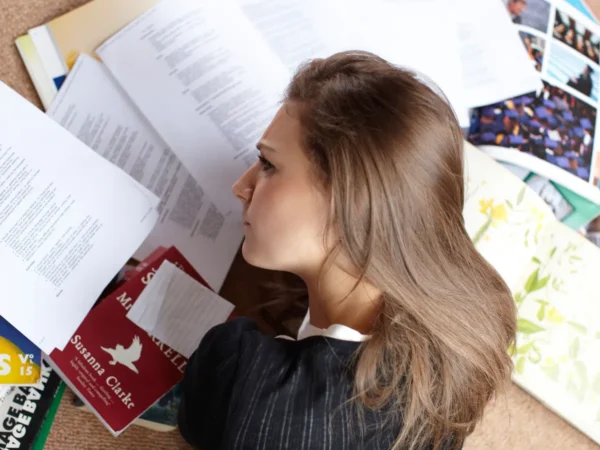
Unconventional Study Techniques That Actually Work for GCSEs

Studying for GCSEs can sometimes feel like trying to climb a mountain with just a backpack – it’s doable, but wouldn’t it be easier if you had some clever tools to help you along the way? Well, good news! You don’t have to stick to the same old study routines.
Let’s dive into some unconventional study techniques that can add a bit of zing to your GCSE prep and, more importantly, be incredibly effective.
The Teaching Method
Have you ever tried explaining a concept you just learned to a friend or even to your cat? Teaching others is a fantastic way to reinforce your own learning. When you explain a concept to someone else, you get a better grasp of the subject anduncover any areas where you might need more clarity.
So, grab a willing listener and start teaching – your grades (and your cat) might just thank you!

Exercise Your Brain and Body
Merging physical exercise with study sessions can be a game-changer. Ever thought about going through your science flashcards while on the exercise bike? Physical activity increases blood flow to your brain, potentially boosting cognitive functions and memory. Plus, it’s a great way to break the monotony of sitting at a desk all day.
Imagine incorporating AI-driven tools into this routine. With Memrizz AI flashcard generator, you can create personalized flashcards that adapt to your learning needs, making study sessions even more effective. As you pedal away, your AI-generated flashcards can dynamically adjust based on your progress, reinforcing challenging concepts and keeping you engaged. This combination of physical activity and tailored study material can help optimize your learning experience and make your exercise time even more productive.
Power Naps for Powerful Memory
Power naps are not just for preschoolers and jet-set businesspeople! Taking a short nap after a study session can actually help consolidate your memories. Study for an hour, then grab a 20-minute nap. You might just wake up with those French vocabulary words firmly planted in your brain.
The Pomodoro Technique
This technique involves studying for 25 minutes and then taking a five-minute break. These short, focused bursts of study, followed by brief breaks, can help maintain your concentration and prevent burnout. It’s like interval training, but for your brain.
Mind Mapping Madness
Instead of writing out your notes in boring bullet points, try mind mapping. Draw your topic in the centre of a page and branch out with your ideas, connecting related concepts. Use different colours, pictures, and symbols – get creative! It’s especially useful for visual learners and can make reviewing more fun and efficient.
Chew on This Idea
Chewing gum while studying and chewing the same flavour during an exam can help jog your memory. The flavour and act of chewing can trigger recall of the material you studied. It’s a bit quirky, but it’s worth a shot!
App Attack
There’s an app for everything these days – including GCSE revision! Apps can make learning interactive and fun, offering everything from quick quizzes to comprehensive subject reviews. They’re perfect for studying on the go and can provide a welcome change from textbooks and notes.
Mnemonic Devices
Mnemonics – creating a song, acronym, or phrase – can be particularly helpful for memorising lists or sequences. For example, to remember the colours of the rainbow, most of us were taught the name Roy G. Biv (red, orange, yellow, green, blue, indigo, violet). Create your own mnemonics to make memorisation less tedious.
Change of Scenery
Studying in the same spot can get dull. Shake things up by moving to different locations. Whether it’s a cafe, your garden, or even a different room in your house, a change of scenery can refresh your mind and improve memory retention.
Yoga Your Way to Success
Practising yoga or meditation can do wonders for your concentration and stress levels. Even a few minutes a day can help calm your mind, making your study sessions more effective. Plus, it’s a great way to take a break from sitting at your desk.
The Feynman Technique
Named after the Nobel Prize-winning physicist Richard Feynman, this technique involves studying a concept and then explaining it in your own words as if teaching someone else. It’s an effective way to ensure you truly understand the material and aren’t just memorising it.
In addition to these techniques, don’t forget about the wealth of resources available online, not to mention more general study and lifestyle hacks that will help you ace those GCSEs. For example:
Setting Realistic Goals
Setting realistic and achievable goals is one of the most important steps in effective GCSE preparation. By identifying what you want to achieve in each subject. Be specific – instead of a general “do well,” aim for targeted grades based on your current performance and potential. Remember, goals should challenge you but also be attainable. Break these down into smaller milestones to track your progress and stay motivated.
The Art of Time Management
Time management is crucial when preparing for GCSEs. Create a revision timetable that allocates study time for each subject based on its difficulty and your proficiency. Be sure to include breaks – they’re vital for maintaining focus and preventing burnout.
Using Past Exam Papers and Mark Schemes
Practicing with past exam papers – for instance, Physics GCSE exams provided by Save My Exams – and understanding the mark schemes can give you an edge in your preparation.
This practice familiarises you with the exam format, question types, and the way answers are graded. Analyse the mark schemes to understand what examiners look for in responses. It’s a great way to gauge your preparation level and identify areas needing improvement.
Building a Support Network
Having a strong support network can greatly enhance your GCSE preparation. This network can include family, friends, teachers, or study groups. Discuss your goals with them; they can provide motivation, assistance, and advice. Regularly participating in study groups can offer different perspectives on subjects, making learning more comprehensive and less isolated.
Healthy Lifestyle Choices
Your physical and mental health plays a significant role in how effectively you prepare for your GCSEs. Ensure you get enough sleep, eat a balanced diet, and exercise regularly. Good physical health boosts your energy levels and concentration, while activities like exercise can reduce stress and improve mental well-being.
Dealing with Stress and Anxiety
It’s natural to feel stressed or anxious in the run-up to GCSEs. Develop strategies to manage these feelings, such as mindfulness exercises, breathing techniques, or engaging in hobbies you enjoy. Maintaining a balance between study and relaxation is important to keep stress levels in check.
Regular Revision and Self-Assessment
Consistent revision is key to retaining information. Use various techniques like flashcards, summarising notes, or teaching concepts to others. Regular self-assessment through quizzes or practice questions helps in gauging your understanding and recall of the material. This ongoing process helps in solidifying knowledge and building confidence.
Seeking Additional Help When Needed
Don’t hesitate to seek additional help if you’re struggling with certain topics. This can be in the form of tutoring, online resources, or extra help from teachers. Sometimes, a different explanation or a new approach to a topic can make all the difference in understanding complex concepts.
The Night Before the Exam
The night before an exam is the time to relax and calm your nerves. Avoid cramming; instead, do a light review of your notes. Ensure you have everything ready for the exam day – pens, calculators, ID, etc. Get a good night’s sleep to ensure you are rested and alert for the exam.
Summing Up

Incorporating these strategies into your GCSE preparation can lead to a more organised, less stressful, and ultimately more successful exam experience. Remember, the key to effective studying isn’t just hard work; it’s also about smart planning, maintaining balance, and staying positive throughout your journey.
Incorporating these unconventional and familiar techniquescan make your GCSE revision more engaging, enjoyable, and effective. Don’t be afraid to try something new – you might just find a method that works perfectly for you.














































